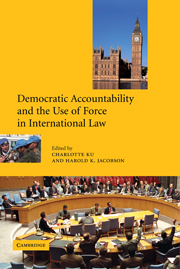Book contents
- Frontmatter
- Contents
- List of figures
- List of tables
- Notes on contributors
- Preface
- List of abbreviations
- I Introduction
- II The domestic and international context
- III Traditional contributors to international military operations
- 6 Canada: committed contributor of ideas and forces, but with growing doubts and problems
- 7 Norway: political consensus and the problem of accountability
- 8 India: democratic, poor, internationalist
- IV Newcomers to international military operations
- V Permanent members of the UN Security Council
- VI Conclusion
- Appendix A. Uses of military forces under the auspices of the UN and NATO
- Appendix B. Country participation in international operations, 1945–2000
- References
- Index
8 - India: democratic, poor, internationalist
Published online by Cambridge University Press: 30 July 2009
- Frontmatter
- Contents
- List of figures
- List of tables
- Notes on contributors
- Preface
- List of abbreviations
- I Introduction
- II The domestic and international context
- III Traditional contributors to international military operations
- 6 Canada: committed contributor of ideas and forces, but with growing doubts and problems
- 7 Norway: political consensus and the problem of accountability
- 8 India: democratic, poor, internationalist
- IV Newcomers to international military operations
- V Permanent members of the UN Security Council
- VI Conclusion
- Appendix A. Uses of military forces under the auspices of the UN and NATO
- Appendix B. Country participation in international operations, 1945–2000
- References
- Index
Summary
Why India matters in this study
This country study of India has a fivefold significance. First, India is the largest troop contributor to UN Peacekeeping Operations (UNPKO), including twenty-four missions, ten force commanders, 4,747 officers, and 47,353 soldiers. As all Indian soldiers serve for a minimum of one year under the UN, rather than the more usual six months, the overall contribution is larger than these numbers might suggest. Ninety-four Indian soldiers have died on peacekeeping duty since 1961, and forty officers and soldiers were decorated or received commendations during UNPKO. India also provided the bulk of the personnel for the three international control commissions (ICC) in Indochina after the 1954 Geneva Agreements. This is a record in which India and its armed forces take immense pride. It is seen both as the nation's commitment to international peace and as a showcase of its military proficiency and tradition.
The Indian army has adequate manpower readily available and trained for peacekeeping, experience in all types of climate and terrain, and the full range of military capabilities from mechanized operations to dismounted infantry, engineer-dominant and humanitarian support, to meet all types of UNPKO. Since a 1993 memorandum of understanding (MOU) with the UN, India has maintained a Standby Brigade Group for UNPKO with a comprehensive all-round capability numbering 4,056 all ranks. An infantry battalion group is deployable within thirty days, and the remainder of the brigade within eight weeks.
- Type
- Chapter
- Information
- Publisher: Cambridge University PressPrint publication year: 2003



